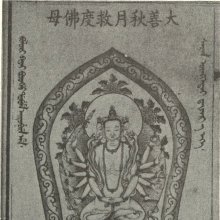Candrakanta, Candrakānta, Candrakāntā, Candra-kanta, Candrakantā, Camdrakamta, Camdrakamti: 23 definitions
Introduction:
Candrakanta means something in Buddhism, Pali, Hinduism, Sanskrit, Jainism, Prakrit, Marathi. If you want to know the exact meaning, history, etymology or English translation of this term then check out the descriptions on this page. Add your comment or reference to a book if you want to contribute to this summary article.
Candrakanta has 21 English definitions available.
Alternative spellings of this word include Chandrakanta.
Images (photo gallery)
Languages of India and abroad
Sanskrit dictionary
[Deutsch Wörterbuch]
Source: Cologne Digital Sanskrit Dictionaries: Böhtlingk and Roth Grosses Petersburger WörterbuchCandrakānta (चन्द्रकान्त):—(ca + kānta)
1) adj. lieblich wie der Mond [Śrutabodha 23.] —
2) m. (Liebling des Mondes) ein best. Edelstein, der der Sage nach aus den Strahlen des Mondes gebildet ist, nur bei Mondschein glänztennd dann eine Feuchtigkeit ausschwitzt, [Hemacandra’s Abhidhānacintāmaṇi 1067.] [Anekārthasaṃgraha 4, 108.] [Medinīkoṣa t. 197.] [Bhartṛhari 1, 20.] ābhīradeśe kila candrakāntaṃ tribhirvarāṭaiḥ vipaṇanti gopāḥ [Pañcatantra I, 88.] himakarakarajātāccandrakāntāt [Dhūrtasamāgama 92, 7.] dṛṣṭvā yasyānanenduṃ bhavati vapuridaṃ candrakāntānusāri [Amaruśataka 57.] [Meghadūta 71.] [Śiśupālavadha 4, 58.] candrakāntodbhavaṃ vāri pittaghnaṃ vimalaṃ smṛtam [Suśruta 1, 173, 1.] [Mémoire géographique 293], wo جندركس fälschlich durch candragupta wiedergegeben wird. Vgl. sūryakānta . —
3) die in der Nacht blühende weisse essbare Wasserlilie, n. [Hemacandra’s Anekārthasaṃgraha] [Ratnamālā im Śabdakalpadruma] m. = kaitava (wofür [Śabdakalpadruma] u. [Wilson’s Wörterbuch] kairava lesen) [Medinīkoṣa] —
4) n. Sandelholz [Ratnamālā im Śabdakalpadruma] —
5) f. ā a) die Gemahlin des Mondes [Śabdakalpadruma] [Wilson’s Wörterbuch] — b) Nacht [Śabdacandrikā im Śabdakalpadruma]
--- OR ---
Candrakānta (चन्द्रकान्त):—
1)
2) [Spr. 2211.] —
6) n. und f. ā Nomen proprium einer Stadt [Rāmāyaṇa 7, 102, 6. 9.]
Source: Cologne Digital Sanskrit Dictionaries: Sanskrit-Wörterbuch in kürzerer FassungCandrakānta (चन्द्रकान्त):——
1) Adj. lieblich wie der Mond [Indische sprüche 7822.] —
2) m. ein best. Edelstein , der nach der Sage aus den Strahlen des Mondes gebildet ist , nur bei Mondschein glänzt und dann eine kühl anzufühlende Feuchtigkeit ausschwitzt [249,23.] —
3) *m. n. die in der Nacht blühende weisse essbare Wasserlilie. —
4) f. ā — a) *die Gattin des Mondes. — b) *Nacht [Rājan 21,46.] — c) Nomen proprium einer Surāṅganā [Indische studien von Weber 15,444.] —
5) f. ā und n. Nomen proprium einer Stadt. —
6) *n. Sandelholz.
Sanskrit, also spelled संस्कृतम् (saṃskṛtam), is an ancient language of India commonly seen as the grandmother of the Indo-European language family (even English!). Closely allied with Prakrit and Pali, Sanskrit is more exhaustive in both grammar and terms and has the most extensive collection of literature in the world, greatly surpassing its sister-languages Greek and Latin.
See also (Relevant definitions)
Partial matches: Candra, Kanta.
Starts with: Camdrakamtashile, Candrakantamanimaya, Candrakantamaya, Candrakantaratnamaya, Candrakantasana.
Full-text (+40): Candramani, Candrakanti, Candrikadrava, Candropala, Candrashila, Manicaka, Candrakantamanimaya, Khasphatika, Shashimani, Shashankopala, Indumani, Suryakanta, Galu, Akashasphatika, Candrakantamaya, Candrakantaratnamaya, Indukanta, Citrakali, Mrigankamani, Candrapushpa.
Relevant text
Search found 37 books and stories containing Candrakanta, Candrakānta, Candrakāntā, Candra-kanta, Candrakantā, Camdrakamta, Camdrakamti, Candra-kānta, Candra-kāntā, Candra-kantā, Candrakaṇṭā, Candra-kaṇṭā, Caṃdrakāṃta, Caṃdrakāṃti, Candrakanti, Candrakānti; (plurals include: Candrakantas, Candrakāntas, Candrakāntās, kantas, Candrakantās, Camdrakamtas, Camdrakamtis, kāntas, kāntās, kantās, Candrakaṇṭās, kaṇṭās, Caṃdrakāṃtas, Caṃdrakāṃtis, Candrakantis, Candrakāntis). You can also click to the full overview containing English textual excerpts. Below are direct links for the most relevant articles:
Garga Samhita (English) (by Danavir Goswami)
Verse 5.16.14 < [Chapter 16 - Comforting Sri Radha and the Gopis]
Verse 2.20.12 < [Chapter 20 - The Rāsa-dance Pastime]
Verse 4.19.62 < [Chapter 19 - A Thousand Names of Srī Yamunā]
Maha Prajnaparamita Sastra (by Gelongma Karma Migme Chödrön)
Act 1.5: The Buddha lights up the trichiliocosm < [Chapter XIV - Emission of rays]
Rasa Jala Nidhi, vol 3: Metals, Gems and other substances (by Bhudeb Mookerjee)
Chapter XXI - Gems (10-11): Suryakanta (sunstone) and Candrakanta (moonstone)
Part 1 - Characteristics of Moon-stone (chandrakanta) and Sun-stone (suryakanta) < [Chapter XXI - Gems (10-11): Suryakanta (sunstone) and Candrakanta (moonstone)]
Vaisheshika-sutra with Commentary (by Nandalal Sinha)
Sūtra 7.2.23 (Priority and Posteriority do not exist in Priority and Posteriority) < [Chapter 2 - Of Number, Separateness, Conjunction, etc.]
Sūtra 7.2.6 (Indirect proof of Unity) < [Chapter 2 - Of Number, Separateness, Conjunction, etc.]
Sūtra 4.2.3 (Nor a compound of three elements) < [Chapter 2 - Of Tangible Atomic Products]
Ramayana of Valmiki (by Hari Prasad Shastri)
Chapter 102 - Rama bestows Kingdoms on Lakshmana’s Sons < [Book 7 - Uttara-kanda]
Bhakti-rasamrta-sindhu (by Śrīla Rūpa Gosvāmī)
Verse 1.4.8 < [Part 4 - Devotional service in Love of God (prema-bhakti)]
Related products

